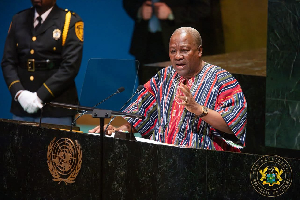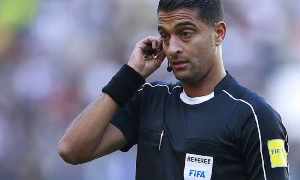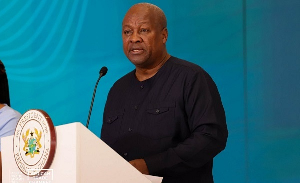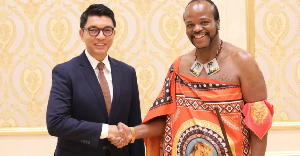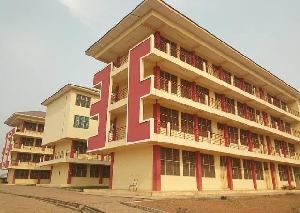If confirmed, he would be the third Chief Justice in two and half years.
Justice George Kingsley Acquah, the President's nominee for the position is well cut out. His job that is: to clean the image of the Judiciary seen as corrupt and a threat to the country's constitutional democracy.
This is particularly essential given the rather strong and widespread public perception of corruption and abuse of power in the judiciary. An 11-month parliamentary investigation confirmed the public's wildest fears last month.
"Corruption is a reality in the judiciary," said the report presented to Parliament in June. The Speaker, Peter Ala Adjetey commissioned the investigation amidst fears that the House was intruding into the affairs of the Judiciary.
The former CJ's office worked with Parliament's Judiciary Committee, which conducted the study. Indeed, Justice Acquah who has cut his teeth deep in reforming the judiciary was the contact person between the investigative committee and the Judiciary.
And on Wednesday, the 61-year-old CJ in-waiting, said corruption and judicial abuse is a threat to the country when he appeared before the Vetting Committee of Parliament chaired by Freddie Blay, First Deputy Speaker.
As the third estate of the realm, the final arbiter in all disputes, the bastion of individual liberties and the citadel of justice, the bespectacled Justice Acquah, also a pastor, said there can be no "freedom, justice and democracy" if the Judiciary's image is in a mess.
His charge and vision will be to clean the image of the Judiciary, speed up modernization and automation of the country's courts but he doesn't support a review of the 1992 Constitution, at least not until the current administration has also worked with it.
Acquah summed up his agenda as CJ by offering "strong leadership."
Radically, the CJ-designate said he would push a programme to train laymen and women to become magistrates. There is no magistrate in the southern half of the Volta Region, he cited.
And as part of his programme, the Ghana Law School will train ordinary people with a university degree or diploma to sit as magistrates to help prune the numerous cases sitting in our courts.
Besides the qualification of a potential magistrate under the programme, age 40 will be the ceiling so that successful applicants can serve a minimum of 20 years after the two-year training in professional and core law.
These magistrates can rise to the rank of chief magistrate. He brushed off potential arguments that the scheme could affect the quality of justice delivered. The benchmark is "dedication" and not that lay people are going to hand down judgments, the eloquent and preachy Justice told the Committee.
If confirmed, would the transparency-minded Justice Acquah introduce a form of the annual "People's Assembly" and Parliamentary Forum" where the executive headed by the President and Parliament led by the Speaker respectively subject themselves to scrutiny by ordinary Ghanaians?
Not exactly.
But he is certain that from next year the Judiciary will produce an annual report on the Judiciary. The report, Acquah told the Vetting Committee would clearly state cases handled by each court, assess the performance of justices, judges and entire judicial staff. He believes that this part of his vision will promote and inspire excellence in the Service by injecting transparency and accountability.
"I believe each judge will sit up I promise you that you will see a new Judicial Service in Ghana," he told the Committee.
Referred simply as Justice KA by his closest pals, Justice Acquah is said to be one of the reform-minded Justices at the Supreme Court.
That clearly sent him into the good books of the equally reform-minded Justice Wiredu who made him chair of the Judicial Service Reform and Automation Committee.
But it is this "extreme closeness" to Justice Wiredu that sparks controversy about Acquah that he was favoured over other Justices of the Supreme Court culminating in his appointment, especially over Justice Joyce Bamford-Addo, a side the storm surrounding the age he started primary school.
"The appointment will not make me a super human being overnight," Justice Acquah hoped.
"I am on very good relations with them [colleague justices] I am not new to my colleagues," he asserted.
He was quick to slip in that since his nomination a week ago; each of his 12 colleagues has called to congratulate him.
This might not necessarily convince critics of his nomination over other senior Supreme Court Justices.
What about the dispute even on the bench over the Parliamentary investigation into the subject of corruption in the Judiciary?
Acquah said most of the issues raised by the report reflect concerns of the leadership of the Judiciary. The Judiciary is awaiting a similar report from an internal committee set up by Justice Wiredu.
Parliament's report will help the Judiciary to tighten loopholes exploited by corrupt members of the judiciary, judicial staff and indeed the public, Justice Acquah said.
But he was quick to point out that corruption neither starts nor ends with the Judiciary. The Parliamentary report also noted this point.
Luckily for Justice Acquah, he was the former Chief Justice's nominee to help the Parliamentary Committee in their investigations across the country.
Justice I.K. Abban died in January 2001. Justice Edward K. Wiredu who took over from Abban resigned from post last month due to ill health.
In sum, Acquah is presently chairman of seven (7) committees of the Judicial Service and member of three (3) others and external examiner (Law of Evidence) of the Ghana Law School.
All these are beside his international obligations, which include being a member of the Africa Regional Council of the International Planned Parenthood and patron of the London-based Commonwealth Legal Education Association.
That must surely be a lot of work for a serving Justice of the Supreme Court. "Yes" Acquah conceded but said he would share the work and delegate more of his responsibilities to his colleagues at the Supreme Court and in the Judicial Services, to make the third arm of government more efficient, flexible and transparent.
It, therefore, came as no surprise when he stoutly defended the creation of the controversial Fast Track Courts (FTC).
Acquah said he will convert some structures near the Kwame Nkrumah Mausoleum in Accra to permanent FTC courts by October.
What does he think of the 1992 Constitution?
He won't subscribe to an amendment of the Constitution. Justice Acquah said the former government worked with the same constitution; therefore the present administration must also work with it. He argued that this could create a firmer basis on what to review in the Constitution.
There were moments of laughter. C.O. Nyanor former Minister of Private Sector Development asked Justice Acquah to answer a question Pontius Pilate put to Jesus Christ during his prosecution. "If you were Christ how would you have answered the question 'what is truth'?"
"Truth is relevant," adding that, it is the basis of justice. But truth also depends on the circumstance, the facts and that's why there is cross-examination in the country's judicial process, Acquah explained.
Justice Acquah was visibly shocked by a question on the name of his wife and the number of children. For the answer he reached for his CV - to the surprise of a section of the Vetting Committee and a section of the public.
Jane he said, is the wife's name. He also has six children.
At least Justice Acquah has one thing in common with his predecessors and that is they all have "K" as the first letter of their middle names.
General News of Friday, 4 July 2003
Source: PA
Justice Acquah Stunned By Question About the Name of His Wife
Entertainment
